Columbus Day 2024: What You Should Know About Its Controversial Legacy
Columbus Day has long been a subject of celebration and controversy in the United States. The holiday, originally created to honor the arrival of Christopher Columbus to the Americas in 1492, has since evolved into a complex issue, sparking debate about its place in modern culture. From its origins to its current status, here’s everything you need to know about Columbus Day, its history, and why it’s changing.
When is Columbus Day?
Columbus Day is observed on the second Monday of October each year. The date isn’t fixed like Christmas or the Fourth of July, but it always falls in early October. In 2024, Columbus Day will be celebrated on October 14th. It marks the anniversary of Christopher Columbus landing in what is now known as the Bahamas on October 12, 1492. This day has been recognized in various forms throughout the United States for over a century, though its meaning and significance have shifted considerably over the years.
Is Columbus Day a Federal Holiday?
Yes, Columbus Day is a federal holiday in the United States. It was officially designated as such in 1937 by President Franklin D. Roosevelt. Federal holidays are recognized across the country, and most federal offices, including government institutions and services, are closed in observance of the day.
However, just because it’s a federal holiday doesn’t mean everyone in the country celebrates it, or even takes the day off. Many states have their own approach to the day, as it has become controversial for its connection to the mistreatment and colonization of Indigenous peoples.
Are Banks Open on Columbus Day?
Since Columbus Day is a federal holiday, most banks in the United States will be closed on that day. Banks such as Chase, Bank of America, and Wells Fargo typically observe all federal holidays, so they will not be open. However, online banking services remain available, allowing customers to check balances, transfer money, and use ATMs. Some smaller, community banks or credit unions might choose to remain open, but it’s always a good idea to check with your local bank ahead of time.
Columbus Day: A National Holiday
The push to make Columbus Day a national holiday began in the 19th century, largely fueled by Italian-American communities. Christopher Columbus, an Italian explorer sailing under the Spanish flag, was seen as a symbol of pride for Italian immigrants who faced significant discrimination in the United States. The holiday grew as a way to celebrate their heritage and contributions to American society.
It was not until 1937 that Columbus Day became a national holiday, recognized at the federal level. However, over time, as the historical narrative around Columbus shifted, so did public attitudes about celebrating him.
Columbus Day: Federal Holiday Status
Although Columbus Day is still considered a federal holiday, its status is increasingly challenged. In many states and cities, Columbus Day has been replaced or renamed, reflecting growing awareness about the consequences of European colonization for Indigenous people. The violent and oppressive legacy associated with Columbus has led many to question whether his actions should be celebrated with a holiday.
In fact, several states, including Hawaii, Alaska, and South Dakota, do not recognize Columbus Day at all. Instead, they observe alternative holidays, such as Indigenous Peoples’ Day. This shift represents a broader trend of reassessing the figures and events historically celebrated in the U.S. and recognizing the need for a more inclusive narrative.
What is Columbus Day?
At its core, Columbus Day commemorates the voyage of Christopher Columbus and his arrival in the Americas in 1492. His expedition, which was funded by Spain, was intended to find a new route to Asia, but instead led to the “discovery” of the New World. For many years, Columbus was celebrated as a brave explorer who opened the door to the eventual founding of the United States.
However, in recent decades, this story has been heavily criticized. While Columbus’ arrival marked a significant moment in history, it also triggered the colonization of Native American lands, the spread of diseases, and the exploitation of Indigenous people. As a result, the day now brings mixed emotions, as it is a reminder of both exploration and the beginning of centuries of suffering for Native populations.
Why is Columbus Day No Longer Celebrated?
Columbus Day has become a controversial holiday in modern times. The celebration of Christopher Columbus is increasingly seen as problematic due to his role in colonization and the impact that European settlers had on Indigenous populations. Rather than being viewed as a heroic figure, Columbus is now often regarded as a symbol of European imperialism, exploitation, and the erasure of Indigenous cultures.
In response to this growing awareness, many places in the United States have stopped celebrating Columbus Day altogether. Instead, they’ve replaced it with holidays that honor the history, culture, and contributions of Indigenous people. This change represents a shift in how American society acknowledges its past and strives for a more inclusive future.
What is Columbus Day Called Now?
In many parts of the U.S., Columbus Day is now known as Indigenous Peoples’ Day. This alternative holiday seeks to honor and celebrate the history and culture of Native American and Indigenous peoples, while also acknowledging the injustices they suffered during colonization.
The movement to rename Columbus Day started in the late 20th century, and today, it is recognized by several states and municipalities across the country. States like Maine, New Mexico, and Oregon officially celebrate Indigenous Peoples’ Day instead of Columbus Day. Many major cities, such as Los Angeles, Denver, and Phoenix, have also made the switch. Indigenous Peoples’ Day offers a way to shift the focus from Columbus’ controversial legacy to a broader recognition of the rich cultural history of Indigenous communities.
Columbus Day History
The history of Columbus Day as a holiday can be traced back to 1792, when the 300th anniversary of Columbus’ landing was celebrated in various U.S. cities. However, it was not until the early 20th century that the idea of making it a national holiday gained momentum. Italian-Americans, particularly in New York City, were among the first to advocate for the holiday as a way to celebrate their heritage and history in the United States.
In 1937, President Franklin D. Roosevelt signed Columbus Day into law as a federal holiday. For decades, it was widely celebrated with parades, speeches, and public events. Schools often taught Columbus’ story as part of American history, emphasizing his bravery and role in opening up the Americas to European exploration.
However, by the 1970s, historians and activists began re-examining the darker side of Columbus’ legacy, sparking a movement to rethink how, or even if, the day should be celebrated.
New Name for Columbus Day
Indigenous Peoples’ Day has become the new name for Columbus Day in many parts of the country. The goal of the new holiday is to recognize the contributions of Native Americans and acknowledge the lasting harm caused by colonization. While not yet a federal holiday, Indigenous Peoples’ Day is gaining more support each year.
President Joe Biden became the first U.S. president to issue a proclamation recognizing Indigenous Peoples’ Day in 2021. This act reflected growing national awareness and acknowledgment of Indigenous history and culture.
When Was Columbus Day Declared an Official Holiday?
Columbus Day was declared an official federal holiday in 1937 by President Franklin D. Roosevelt. The push for the holiday came primarily from the Knights of Columbus, a Catholic fraternal organization that wanted to honor their namesake. Italian-American communities also rallied behind the holiday as a way to celebrate their cultural heritage.
Though it was initially embraced as a proud moment of American history, public sentiment has since evolved, leading to the reevaluation of the holiday and its impact on Indigenous peoples.
In conclusion, Columbus Day remains a contentious holiday, celebrated by some but rejected by many. As the U.S. continues to grapple with its historical narrative, the shift from Columbus Day to Indigenous Peoples’ Day reflects a broader effort to acknowledge the often overlooked histories and contributions of Native Americans.



